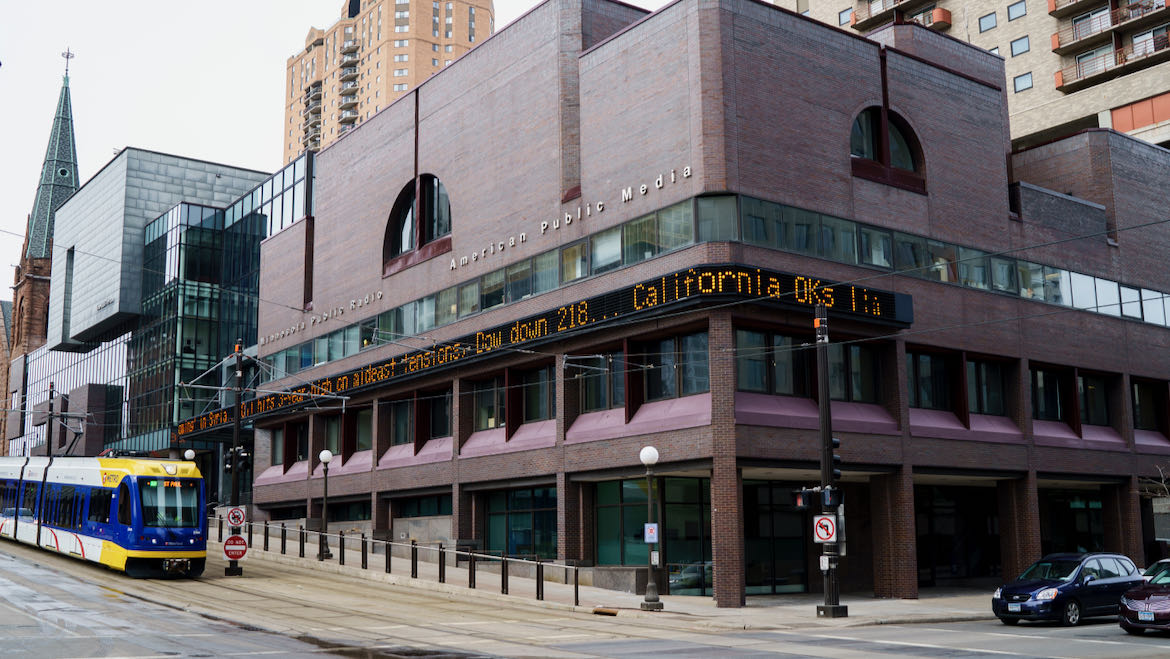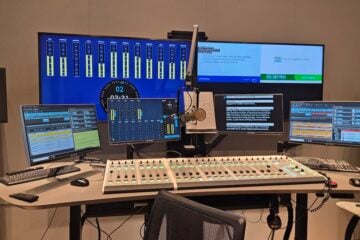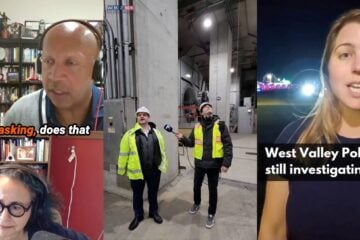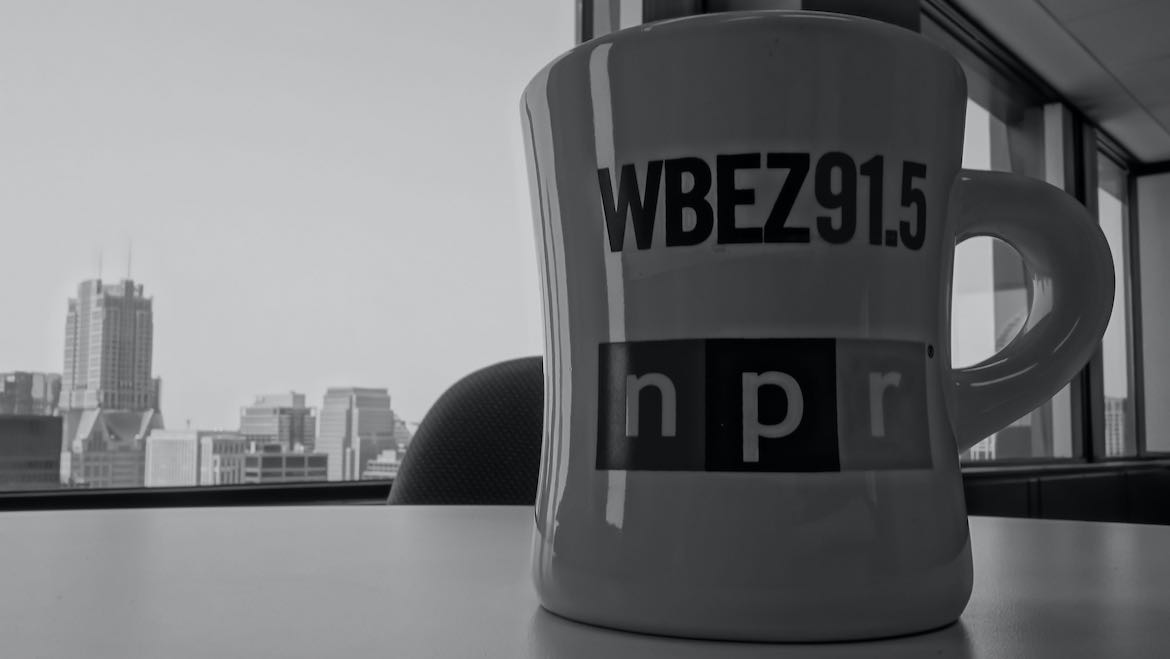Day One of NPR One: Some first reactions

NPR One in action.
NPR’s long-awaited mobile app NPR One launched yesterday, allowing iPhone and Android users to tune into a stream of curated and algorithm-powered newscasts, segments, podcasts and local content.
After a brief introduction from NPR host Guy Raz, NPR One prompts users to log in using Google, Facebook or NPR accounts. The app allows users to choose a local station, search for stories and programs and donate via voice-activated prompts.
NPR is delaying a marketing push for the app until the fall, after station pledge drives, but eager users are already downloading NPR One and giving it a test run. At Nieman Lab, news analyst Ken Doctor discussed NPR’s aim to appeal to younger audiences and the risk NPR One might pose to stations.
“NPR is sending its content directly to listeners, potentially bypassing the stations and their earlier quasi-monopoly in bringing it to us,” Doctor writes. “The local branding is the tradeoff. Like all tradeoffs, it won’t be exactly 50-50.”
The app’s login requirements feeds listener data to NPR, and TechCrunch notes the network will “be able to research listener habits and gather feedback that will likely influence future program[s]– which isn’t a bad thing. In fact, this is a sign that NPR is very much concerned with what future iterations of public radio (or its online equivalent) will look like, and being able to contribute to that project is no small thing.”
NPR One’s early adopters took to Twitter to share their reactions Monday. A sampling:
https://twitter.com/gerald_arthur/status/493796608816185344
More excited than I should be about the new NPR One radio app – http://t.co/lisvHZiKVe
— Aaron Gotwalt (@gotwalt) July 28, 2014
NPR launches: NPR One app
(Clean! Who says public radio can't have good design?)
http://t.co/IQJGWQWEhq pic.twitter.com/kFL3x1w0ME— Jonathan Shariat (@DesignUXUI) July 28, 2014
https://twitter.com/matthewmagellan/status/493799607835840512
Enjoying new @NPR One app (http://t.co/R2L1ei8oi1). Brilliant initial setup experience. But is wash-over-you NPR audio “listening"?
— Jay Brodsky (@jbrodsky) July 28, 2014
https://twitter.com/meigs/status/493795150699581441
NPR One http://t.co/LvfDfT0OIo
I'll definitely be using this. 3 walks a day with a border collie requires 90 mins of content a day.
— Tony Marks (@tonymarks__) July 28, 2014
https://twitter.com/aschweig/status/493859291887964160
Interesting that @nprone doesn’t update the URL when the piece changes — could hurt sharing http://t.co/YN2NiqZFkt
— Joshua Benton (@joshuabenton.com on Bluesky) (@jbenton) July 28, 2014
How do you like NPR One so far? Leave a comment or email us.







Not as easy to find what I am looking for as the older NPR App. In the other one I liked being able to switch between local live
stream, choose live streams by show across country, and archived
programs. Search function needs work. I searched for (podcasts) “Radio Lab” as two words and got no results. Searching as one word revealed only one RL story, not a list of RL podcasts. Looking forward to seeing how this develops.
Hi Laura – would it help if you thought of the app as a “Pandora for NPR?” I don’t see it as a place to go find individual pieces but as a way to craft my own NPR station by showing interests in certain pieces/categories/etc. as they go by (and there’s a skip button!).
yes that’s an interesting thought that changes my perspective.
I’m not impressed by the 1.0 version of this app. I had the same experience as Ms. Miller. I don’t know why somebody using the audio stream through the NPR app would want to switch to the NPR One app. I primarily use TuneIn to stream internet radio, works great.
Hi Freddie – would it help if you thought of the app as a “Pandora for NPR?” I don’t see it as a place to go find individual pieces but as a way to craft my own NPR station by showing interests in certain pieces/categories/etc. as they go by (and there’s a skip button!).
I’m more of the listener that has core favorite shows and subscribes to the show’s email so that I know what is in the pipeline and will most likely listen to them regardless of the topic. I’ve never been a fan of jumping from one segment to the next when it comes to NPR programming. I don’t know why NPR thinks that sort of listening is the way forward.
Tons and tons and tons of research looking at listening habits and content ingest habits across multiple platforms. I get where you’re coming from, and there are great options for the way you use media. This is geared more towards the Pandora, iHeart, Slacker, etc. crowd.
Hi Freddie — some program directors at public radio stations support segments over hourlong shows because research shows most listeners only tune in for about 10 minutes at a time. They also argue that since NPR’s newsmagazines are among public radio’s most popular shows, that suggests that segmented shows may have a broader appeal. Here’s an article with some more details about this. http://www.current.org/2012/09/what-to-do-about-public-radios-ratings-slide/
It shouldn’t be surprising that ME and ATC are the most popular shows, that is when people are traveling and listening to the radio/smart phone app.
These shows are the bookends of NPR programming, although I find them to be very dry and difficult to listen to even one segment. Except for Wade Goodwyn, that guy is awesome!
I also know that research and numbers can show you anything. And people listening on mobile devices probably listen to segments 10 minutes at a time, while those listening in their cars and homes probably listen longer than 10 minutes. I understand that some people listen to segments and enjoy them but what I like about public radio is a longer format of discussion and dissection of topics.
Actually, that 10-minute figure I cited was for over-the-air listening, not mobile, so it was incorporating in-car and in-home listening.
So NPR is basically downplaying the importance of shows like On Point, the Diane Rehm show, Forum, Terry Gross and Brian Leher because they are hour long interview shows. Also none of which are produced at NPR headquarters or NPR West. I understand the importance of NPR expanding its market, trust me I do, I work at an NPR affiliate, but I’m leery of NPR’s, what I feel is an aggressive campaign against member stations to under cut them, and eventually there will be a disconnect between member stations and listeners, and NPR will be right in the middle of it.
Two things here – there are lots of platforms available to get content from those programs (and many others like them), and content from these programs is included in NPR One. For example – a search for Fresh Air turns up their podcast. NPR One is an expansion of their product offerings, not a contraction. It gives a target audience a new way to experience a mix of local and national content. No reason to switch away from the podcast aggregators available in many different flavors, but if you want to discover new content while experiencing the programs you already know and enjoy (along with content provided by your “favorite” station), then NPR One may be a good choice.
I like it. I stopped listening to NPR a while ago, and this may help me return as a casual listener.
It didn’t.
The NPR is just amazing. Who does not want to get hiss all important and favorite thing through a single way. It is lovely to get used to with the NPR.